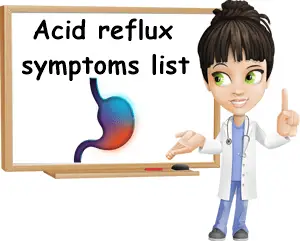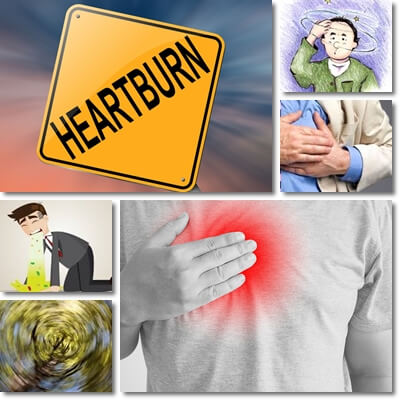Acid reflux is formally known as GERD or gastroesophageal reflux disease. It is a medical condition caused by stomach juices escaping the stomach and rising into the esophagus. Since stomach juices are highly acidic, they produce irritation and inflammation upon contact with the sensitive mucous lining of the esophagus, similar to a burn.
The range of acid reflux symptoms goes from more common signs such as heartburn and chest pain, bad taste in the mouth, burping, hiccups, pain after eating or indigestion to symptoms that are not necessarily indicative of stomach acidity such as a dry cough, sore throat, sore tongue, hoarseness, wheezing, nausea and vomiting and even laryngospasms.
Below is a full list of acid reflux/GERD signs and symptoms to help you be able to tell if what you are experiencing is, in fact, stomach acidity.

1)Coughing And acid reflux
An acid reflux cough is typically a type of dry cough (unproductive cough, one that doesn’t produce excess mucus). Coughing in GERD can occur as a reflex, a reaction to the stomach juices rising into the esophagus.
The backflow can sometimes cause a tingling sensation in the throat which triggers the coughing reflex. In some instances, as the stomach juices find their way back down thanks to gravity, they may irritate and burn the larynx too or risk going down the wrong pipe in which case they may also trigger a coughing reflex. GERD-associated coughing can become chronic if the condition is not treated.
Sometimes, as stomach juices come back down, they may leak into the lungs which poses a whole new set of problems. Stomach juices are highly acidic, corrosive even, slowly eating away at mucous membranes and each exposure produces deeper tissue damage.
If aspirated into the lungs, even in the smallest amounts, they have an irritating effect and can cause inflammation of the lungs or aspiration pneumonia. The accidental inhalation or aspiration of gastric juices into the lungs is called gastric juice aspiration syndrome and can be caused by chronic GERD, especially in instances of GERD-associated vomiting.
2) Sore throat And acid reflux
Why does GERD cause a sore throat? Gastric juices are highly acidic and each time they make their way up into the esophagus, they irritate and burn the sensitive mucous linings they come into contact with, whether it’s that of the esophagus, pharynx or even back of the mouth. Regular acid reflux episodes cause damage to build up and result in a persistent sore throat sensation.
The back of the throat will look red, irritated and inflamed, but without white spots or patches characteristic of respiratory infections. Instead there may be some clear-whitish mucus present (mucus is produced to counteract the damaging, corrosive effects of stomach juices). Acid reflux sore throat may feel swollen, scratchy, dry, hot or burning.
3) Sore tongue And acid reflux
Acid reflux causes a sore throat as well as a sore tongue. Sometimes, the entire tongue may feel feel sore, sometimes only the back of the tongue. Tongue soreness can be a direct result of the corrosive gastric juices backflowing into the mouth or can be caused by vomiting associated with acid reflux disease (vomiting usually causes tongue soreness).
This is a more a typical symptom of GERD and tends to occur in more severe forms of the condition.

4) Bad taste in the mouth And acid reflux
While it’s not commonly associated with the condition by sufferers, a bad taste in the mouth is a telling symptom of acid reflux disease. It is usually caused by stomach juices rising so far up into the esophagus that they are essentially regurgitated into the mouth.
Seeing they are highly acidic, they leave a noticeable and sometimes lasting imprint on taste perception, usually in the form of a bad, metallic, bitter or sour, sharp, acidic taste. If you wake up coughing in the middle of the night because of a bad, acidic taste in the mouth, then it’s likely a really bad case of nighttime acid reflux. If you get a bad, acidic taste in the mouth while lying down, especially on your back, then it’s also likely you have acid reflux.
5) Hoarseness
If you frequently experience hoarseness after a meal or after lying down to rest, especially after eating, then you could be experiencing acid reflux. Changes in pitch, a raspy, harsh, rough or grating quality to one’s voice associated with throat scratchiness or soreness, redness and inflammation or a hot, burning sensation can be caused by acid reflux. Gastric acids escaping into the esophagus can produce damage to the voice box, irritating vocal cords and producing changes to one’s voice.
6) Wheezing
Wheezing and acid reflux are not normally associated by GERD sufferers which makes wheezing an a typical symptom.
During a reflux episode, stomach juices make their way up into the esophagus, then down. And as they go down again, there may be an accidental aspiration of part of the stomach juices into the airways, producing irritation.
This not only triggers a coughing reflex, but can also cause wheezing. Wheezing in acid reflux can be described as various degrees of laborious breathing, but most often it’s like breathing with a whistling-kind of sound in the background accompanying breaths.
It can be more or less noticeable, depending on the person. If the reflux is not treated, there will be damage to the airways and even lungs over time which can promote asthma episodes or an increase in their frequency, especially in those with an existing condition that is currently not very well managed.
7) Difficulty swallowing (dysphagia)
Over time, repeated episodes of acid reflux cause a sort of erosion of the esophagus lining. As food or fluids come into contact with the damaged mucous lining, discomfort or even a pain sensation may be experienced. Any form of difficulty swallowing, whether mere discomfort or actual pain, should be investigated by a medical professional as soon as possible.
8) Lump in throat sensation
The feeling of having a lump in the throat is called a globus sensation and it’s a rather atypical, yet not surprising symptom of acid reflux disease. What happens is the repeated exposure to the naturally erosive gastric acids slowly eats away at the mucous membranes of the esophagus and pharynx, producing damage and affecting sensation.
The result is a globus sensation, a feeling of having something like a pill stuck in your throat or like a lump in your throat. You can feel it when you ingest food or liquids or when you are just swallowing saliva or talking. This is a symptom worth investigating at your doctor’s and often indicates severe reflux disease.
9) Heartburn
One of the most common symptoms of acid reflux is heartburn. Heartburn can be described as a painful, hot, burning sensation in the chest. It is usually experienced in the middle of the chest, close to where the heart is (hence the reason it’s called heart-burn and often mistaken for a symptom of a heart attack). Heartburn is actually the stomach acids rising into the esophagus and producing immediate irritation of its mucous lining.
10) Chest pain And acid reflux
It’s associated with heartburn and a common sign of acid reflux disease.
Chest pain is actually the lingering effect or sensation that comes after the immediate experience of heartburn. It’s the aftermath of the gastric acid making its way up into the esophagus. It can persist long after the heartburn sensation and is a result of the damage done by the gastric acid.
Having small sips of water immediately after experiencing heartburn, then taking appropriate medication, standing to allow gravity to help with digestion and keep stomach juices down can help prevent and reduce chest pain in GERD. Chest pain is also a sign of a heart attack.
11) Bad breath
The juices in our stomach that help us digest food are highly acidic and taste and smell bad: sharp, pungent, sour, bitter, metallic even. Add the lingering aromas of the foods being broken down and there’s no way whatever we regurgitate comes back smelling nice. Especially if we eat foods like garlic, onions, pickles, various fermented dairy or other foods, fish etc.
The more frequent and severe the reflux, the more likely the bad breath and the worse the smell emanated. Over time, there may be teeth damage from the stomach acids which can further contribute to bad breath. The bad breath from GERD is more evident early in the morning, when waking up.
12) Excessive burping, hiccups
Acid reflux with excessive burping and hiccups is a common occurrence in GERD, although the symptoms are not usually associated with the condition. Both the burping and hiccups are caused by air escaping the stomach along with stomach juices.
These symptoms are made worse by eating certain foods such as pickled foods, cabbage and related vegetables, onions, garlic, leek, fermented dairy, high-fiber foods such as nuts, carbonated beverages or sparkling water and processed foods, including ice-cream, chocolate, cakes etc.
Burping a lot and continuously is a sign you need to start making serious dietary and lifestyle changes. The cure for acid reflux-related burping and hiccups is a better diet which means excluding potentially problematic foods.
See my personal list of foods to eat and to avoid for acid reflux.
13) Excess salivation
In acid reflux, you basically regurgitate highly acidic stomach juices that damage the lining of the esophagus, sometimes more along the way. In response to this, the body triggers the production of more saliva to counteract the damaging effects of the stomach juices. The purpose of saliva is to protect the esophagus and help wash down the acidic stomach juices. Excess salivation can also occur shortly before and after vomiting associated with GERD.
14) Stomach pain after eating
Stomach pain after eating can occur in acid reflux disease although it’s one of the more surprising symptoms, usually not associated with the condition by sufferers.
Pain can occur during a meal as well, a short while after eating. In both cases, during a meal and post-meal, the pain is caused by eating too much or eating the wrong foods that cause indigestion or act as a trigger for acid reflux.
Some of the foods that trigger GERD symptoms include processed, heavy, fatty, oily or fried, acidic foods, high-fiber foods (eaten in excess), coffee, chocolate, cocoa, alcohol, carbonated beverages, garlic, onions and hot spices (turmeric, horseradish, spicy mustard, raw ginger).
Ideally, avoid large meals and eat little and often instead. Just as important, eat clean and natural by preparing your meals from scratch and not using too much seasoning of any kind. Also, boil or grill foods, avoid fatty dressings and stand, walk or sit upright for at least an hour or sometimes more after eating to avoid stomach pain. Just as important, have any recurring stomach pain investigated by a doctor to exclude other potentially more serious causes.
15) Nausea and vomiting
Nausea and a vomiting sensation or actual vomiting, particularly early in the morning after waking up, are telling signs of acid reflux disease, sometimes more serious digestive conditions (example: ulcer). When these symptoms occur, it is a sign the condition is severe and requires prompt treatment. Nausea and vomiting can also occur as a result of indigestion, or in association with gastritis.
16) Laryngospasms and asthma episodes
Acid reflux is a known trigger for both laryngospasms (short, temporary constriction of the airways, often caused by exposure to allergens such as pollen, irritants, dust etc.) and asthma. People with laryngospasms or asthma are advised to manage their diet and lifestyle so that they may avoid triggers such as stomach acidity.
In people with laryngospasms or asthma, a rise in frequency of episodes may indicate underlying stomach acidity that needs to be dealt with appropriately.
